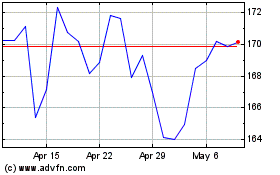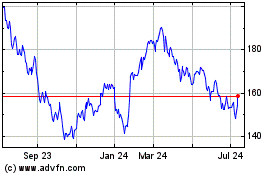Tiffany Receives Offer From LVMH -- WSJ
October 28 2019 - 3:02AM
Dow Jones News
By Ben Dummett and Suzanne Kapner
This article is being republished as part of our daily
reproduction of WSJ.com articles that also appeared in the U.S.
print edition of The Wall Street Journal (October 28, 2019).
Tiffany & Co. has received a takeover approach from LVMH
Moët Hennessy Louis Vuitton, which is seeking to add the iconic
U.S. jeweler to its portfolio of upscale brands.
The French company sent Tiffany officials a letter in the past
couple of weeks outlining an all-cash takeover bid of roughly $120
a share, according to people familiar with the matter. That would
value Tiffany at close to $14.5 billion.
The companies aren't in talks but Tiffany is expected to work
quickly on a response, some of the people said. Even though the bid
represents a premium of 30% or more to where Tiffany traded when
the offer was made, according to one of the people, LVMH is
expected to have to pay up even more if it wants to clinch the
deal.
Shares of New York-based Tiffany closed Friday at $98.55, giving
it a market value of nearly $12 billion. The stock reached nearly
$140 a share during the summer of 2018.
LVMH has a market value of EUR193 billion ($214 billion).
Bloomberg earlier reported on LVMH's interest in Tiffany.
Buying Tiffany would increase Paris-based LVMH's exposure to
jewelry, one of the fastest-growing businesses in the luxury
sector. In 2018, the global jewelry market grew 7% and was worth
about EUR18 billion, according to Bain & Co. Tiffany, with more
than 300 stores globally, is one of the world's largest jewelers,
along with Cartier and LVMH-owned Bulgari, but it has been unable
to keep pace with European rivals.
Tiffany, which has about $4 billion in annual revenue, has
struggled with lackluster sales growth for years.
The 182-year-old brand has been trying to rebuild its business
after ousting its chief executive two years ago amid pressure from
an activist investor. The stock, which had slumped near $60 in
2016, has been hovering around $100 for much of the past year.
Under CEO Alessandro Bogliolo, the jeweler has pushed an
expansion into China, with plans to open flagship stores in several
major cities. The chain, which relies heavily on tourist spending
in the U.S. market, also has been renovating its flagship New York
store on Fifth Avenue.
Tiffany also has tried to broaden its appeal with marketing that
includes more minorities and same-sex couples, added new products
for younger shoppers and introduced a jewelry line for men.
But in recent quarters sales have slipped both in the U.S. and
Asia. Excluding currency swings, comparable sales have declined
from a year earlier for two straight quarters. In August,
executives cautioned that the protests in Hong Kong and a
macroeconomic slowdown could damp profits for the rest of the
year.
Luxury-goods companies have been pressured by fears of an
economic slowdown in China, where shoppers account for roughly
one-third of luxury-goods purchases world-wide. Escalating trade
tensions also have played a part in waning consumer confidence in
China.
Tiffany would be one of the biggest acquisitions yet by Bernard
Arnault, LVMH's chief executive and controlling shareholder. Mr.
Arnault paid EUR12 billion in 2017 to unite the storied fashion
house Christian Dior with LVMH.
LVMH, which has roughly $50 billion in annual revenue, also
relies on Chinese shoppers for a chunk of its sales. But the
conglomerate is so large and has so many brands -- from Louis
Vuitton to Dom Pérignon -- that it has fared better than Tiffany in
recent years. Revenue jumped in its latest quarter, showing little
impact from the Hong Kong protests or the U.S.-China trade
tensions.
LVMH could use its deep pockets to develop product lines where
Tiffany is weak. In addition to Bulgari, LVMH owns luxury
watchmakers Hublot and TAG Heuer.
"Tiffany has yet to express its full potential -- for example in
design jewelry and watches," says Bernstein & Co. analyst Luca
Solca.
The deal would significantly expand LVMH's presence in the U.S.,
giving it more exposure to U.S. dollar-denominated revenue and
reducing foreign-exchange risk, Mr. Solca says.
Tiffany's Mr. Bogliolo is familiar with LVMH; he spent 16 years
at Bulgari before LVMH took control of the company in 2011 and then
served as North American operating chief at LVMH's Sephora unit for
a little more than a year. Before joining Tiffany, he was CEO of
Italian apparel company Diesel SpA.
--Matthew Dalton contributed to this article.
Write to Ben Dummett at ben.dummett@wsj.com and Suzanne Kapner
at Suzanne.Kapner@wsj.com
(END) Dow Jones Newswires
October 28, 2019 02:47 ET (06:47 GMT)
Copyright (c) 2019 Dow Jones & Company, Inc.
LVMH Moet Hennessy Louis... (PK) (USOTC:LVMUY)
Historical Stock Chart
From Mar 2024 to Apr 2024

LVMH Moet Hennessy Louis... (PK) (USOTC:LVMUY)
Historical Stock Chart
From Apr 2023 to Apr 2024
